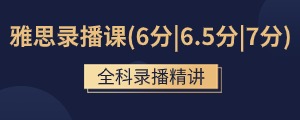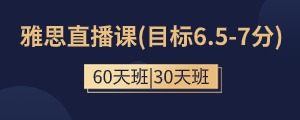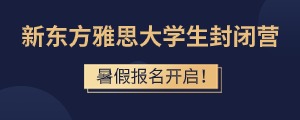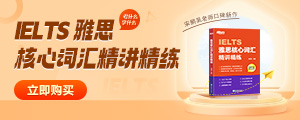

雅思备考规划
扫码添加助教免费咨询雅思备考规划

扫码关注回复雅思获取最新雅思口语题库和备考资料
新东方在线雅思网特为大家准备了雅思阅读练习题:选择和幸福,供大家学习参考。雅思阅读备考阶段,同学们需要通过适量的练习题来检测自己的备考效果。希望以下内容能够对大家的雅思备考有所帮助!
A Americans today choose among more options in more parts of life than has ever been possible before. To an extent, the opportunity to choose enhances our lives. It is only logical to think that if some choice is good, more is better; people who care about having infinite options will benefit from them, and those who do not can always just ignore the 273 versions of cereal they have never tried. Yet recent research strongly suggests that, psychologically, this assumption is wrong. Although some choice is undoubtedly better than none, more is not always better than less。
B Recent research offers insight into why many people end up unhappy rather than pleased when their options expand. We began by making a distinction between "maximizers" (those who always aim to make the best possible choice) and "satisficers" (those who aim for "good enough," whether or not better selections might be out there)。
C In particular, we composed a set of statements—the Maximization Scale—to diagnose people's propensity to maximize. Then we had several thousand people rate themselves from 1 to 7 (from "completely disagree" to "completely agree") on such statements as "I never settle for second best." We also evaluated their sense, of satisfaction with their decisions. We did not define a sharp cutoff to separate maximizers from satisficers, but in general, we think of individuals whose average scores are higher than 4 (the scale's midpoint) as maximizers and those whose scores are lower than the midpoint as satisficers. People who score highest on the test—the greatest maximizers—engage in more product comparisons than the lowest scorers, both before and after they make purchasing decisions, and they take longer to decide what to buy. When satisficers find an item that meets their standards, they stop looking. But maximizers exert enormous effort reading labels, checking out consumer magazines and trying new products. They also spend more time comparing their purchasing decisions with those of others。
D We found that the greatest maximizers are the least happy with the fruits of their efforts. When they compare themselves with others, they get little pleasure from finding out that they did better and substantial dissatisfaction from finding out that they did worse. They are more prone to experiencing regret after a purchase, and if their acquisition disappoints them, their sense of well-being takes longer to recover. They also tend to brood or ruminate more than satisficers do。
E Does it follow that maximizers are less happy in general than satisficers? We tested this by having people fill out a variety of questionnaires known to be reliable indicators of well-being. As might be expected, individuals with high maximization scores experienced less satisfaction with life and were less happy, less optimistic and more depressed than people with low maximization scores. Indeed, those with extreme maximization ratings had depression scores that placed them in the borderline clinical range。
F Several factors explain why more choice is not always better than less, especially for maximizers. High among these are "opportunity costs." The quality of any given option cannot be assessed in isolation from its alternatives. One of the "costs" of making a selection is losing the opportunities that a different option would have afforded. Thus an opportunity cost of vacationing on the beach in Cape Cod might be missing the fabulous restaurants in the Napa Valley. If we assume that opportunity costs reduce the overall desirability of the most preferred choice, then the more alternatives there are, the deeper our sense of loss will be and the less satisfaction we will derive from our ultimate decision。
G The problem of opportunity costs will be worse for a maximizer than for a satisficer. The latter's "good enough" philosophy can survive thoughts about opportunity costs. In addition, the "good enough" standard leads to much less searching and inspection of alternatives than the maximizer's "best" standard. With fewer choices under consideration, a person will have fewer opportunity costs to subtract。
H Just as people feel sorrow about the opportunities they have forgone, they may also suffer regret about the option they settle on. My colleagues and I devised a scale to measure proneness to feeling regret, and we found that people with high sensitivity to regret are less happy, less satisfied with life, less optimistic and more depressed than those with low sensitivity. Not surprisingly, we also found that people with high regret sensitivity tend to be maximizers. Indeed, we think that worry over future regret is a major reason that individuals become maximizers. The only way to be sure you will not regret a decision is by making the best possible one. Unfortunately, the more options you have and the more opportunity costs you incur, the more likely you are to experience regret。
I In a classic demonstration of the power of sunk costs, people were offered season subscriptions to a local theater company. Some were offered the tickets at full price and others at a discount. Then the researchers simply kept track of how often the ticket purchasers actually attended the plays over the course of the season. Full-price payers were more likely to show up at performances than discount payers. The reason for this, the investigators argued, was that the full-price payers would experience more regret if they did not use the tickets because not using the more costly tickets would constitute a bigger loss。
J LESSONS
Choose when to choose。
We can decide to restrict our options when the decision is not crucial. For example, make a rule to visit no more than two stores when shopping for clothing。
Learn to accept "good enough."
Settle for a choice that meets your core requirements rather than searching for the elusive "best." Then stop thinking about it。
Don't worry about what you're missing。
Consciously limit how much you ponder the seemingly attractive features of options you reject. Teach yourself to focus on the positive parts of the selection you make。
Control expectations。
"Don't expect too much, and you won't be disappointed" is a clich. But that advice is sensible if you want to be more satisfied with life。
本文关键字: 雅思阅读练习题:选择和幸福

 资料下载
资料下载
雅思写作高频词汇PDF下载
发布时间:2023-08-26添加新东方在线雅思助教号
回复【200】获取
590组雅思阅读写作必背短语PDF版下载
发布时间:2023-08-09添加新东方在线雅思助教号
回复【590】获取
雅思学术词汇搭配表PDF版下载
发布时间:2023-08-04添加新东方在线雅思助教号
回复【ACL】获取
雅思口语part3结构策略PDF版下载
发布时间:2023-08-04添加新东方在线雅思助教号
回复【Part3】获取
雅思听力高频场景词PDF版下载
发布时间:2023-08-09添加新东方在线雅思助教号
回复【高频词】获取
雅思口语Part2答案示范15篇PDF下载
发布时间:2023-07-26添加新东方在线雅思助教号
回复【P2】获取
雅思小作文35组必备表达PDF下载
发布时间:2023-07-26添加新东方在线雅思助教号
回复【35】获取
雅思阅读高频短语PDF下载
发布时间:2023-07-20添加新东方在线雅思助教号
回复【短语】获取
200组雅思写作高频词汇PDF下载
发布时间:2023-07-20添加新东方在线雅思助教号
回复【200】获取
雅思写作话题词汇PDF下载
发布时间:2023-07-16添加新东方在线雅思助教号
回复【话题】获取
50组雅思口语同义替换词PDF下载
发布时间:2023-07-10添加新东方在线雅思助教号
回复【替换】获取
雅思写作大作文精选题目101PDF下载
发布时间:2023-07-09添加新东方在线雅思助教号
回复【101】获取
雅思口语核心300词PDF下载
发布时间:2023-06-23添加新东方在线雅思助教号
回复【300】获取
雅思阅读分类词汇PDF下载
发布时间:2023-06-17添加新东方在线雅思助教号
回复【分类词】获取
雅思口语必备习语PDF下载
发布时间:2023-06-17添加新东方在线雅思助教号
回复【习语】获取
雅思小作文常用词汇66词PDF下载
发布时间:2023-06-16添加新东方在线雅思助教号
回复【66】获取
雅思口语常见功能结构109句PDF下载
发布时间:2023-06-08添加新东方在线雅思助教号
回复【109】获取
10年雅思写作题库PDF下载
发布时间:2023-06-08添加新东方在线雅思助教号
回复【写作话题】获取
雅思图表作文精选套句50句PDF下载
发布时间:2023-05-28添加新东方在线雅思助教号
回复【50】获取
雅思写作99组高频词汇PDF资料
发布时间:2023-05-28添加新东方在线雅思助教号
回复【99】获取
2023年5月雅思口语新题题库PDF版本
发布时间:2023-05-14添加新东方在线雅思助教号
回复【新题】获取
2023年5-8月雅思口语新题题库与解析PDF版本
发布时间:2023-05-06关注新东方在线考雅课程中心服务号
回复【新题】获取
雅思听力考点词汇PDF资料
发布时间:2023-04-27添加新东方在线雅思助教号
回复【考点词】获取
雅思听力机经词汇PDF资料
发布时间:2023-04-24添加新东方在线雅思助教号
回复【TL】获取
雅思口语Part1常见话题语料库PDF资料
发布时间:2023-04-20添加新东方在线雅思助教号
回复【Part1】获取
剑桥雅思阅读长难句50句PDF资料
发布时间:2023-04-19添加新东方在线雅思助教号
回复【长难句】获取
雅思阅读核心学术词汇表PDF资料
发布时间:2023-04-07关注新东方在线考雅课程中心服务号
回复【核心】获取
100个雅思写作观点词和替换词表达PDF资料
发布时间:2023-03-24关注新东方在线考雅课程中心服务号
回复【100】获取
雅思阅读分类词汇PDF资料
发布时间:2023-03-22关注新东方在线考雅课程中心服务号
回复【分类词】获取
雅思阅读短语PDF资料
发布时间:2023-03-08关注新东方在线考雅课程中心服务号
回复【短语】获取

添加新东方在线雅思助教,
回复【口语】获取雅思口语资料大礼包

 推荐阅读
推荐阅读
很多考鸭在备考过程中会想去寻找一些原文资料,想要轻松有效地提升自己的雅思水平,这是非常不错的做法! 本文主要为大家介绍实用的英文书籍,希望对大家的雅思备考有所帮助。
很多考鸭在备考过程中会想去寻找一些原文资料,想要轻松有效地提升自己的雅思水平,这是非常不错的做法! 本文主要为大家介绍实用的英文书籍,希望对大家的雅思备考有所帮助。
很多考鸭在备考过程中会想去寻找一些原文资料,想要轻松有效地提升自己的雅思水平,这是非常不错的做法! 本文主要为大家介绍实用的英文书籍,希望对大家的雅思备考有所帮助。
很多考鸭在备考过程中会想去寻找一些原文资料,想要轻松有效地提升自己的雅思水平,这是非常不错的做法! 本文主要为大家介绍实用的英文书籍,希望对大家的雅思备考有所帮助。
很多考鸭在备考过程中会想去寻找一些原文资料,想要轻松有效地提升自己的雅思水平,这是非常不错的做法! 本文主要为大家介绍实用的英文书籍,希望对大家的雅思备考有所帮助。






 公开讲座
公开讲座
地点:中关村海龙大厦11层麻省理工会议室
价格 : ¥0元
听力|阅读|写作|口语在线做题,更好的备战考试!
价格 : ¥0元


 资料下载
资料下载
添加新东方在线雅思助教号
回复【200】获取
添加新东方在线雅思助教号
回复【590】获取
添加新东方在线雅思助教号
回复【ACL】获取
添加新东方在线雅思助教号
回复【Part3】获取
添加新东方在线雅思助教号
回复【高频词】获取
添加新东方在线雅思助教号
回复【P2】获取
添加新东方在线雅思助教号
回复【35】获取
添加新东方在线雅思助教号
回复【短语】获取
添加新东方在线雅思助教号
回复【200】获取
添加新东方在线雅思助教号
回复【话题】获取
添加新东方在线雅思助教号
回复【替换】获取
添加新东方在线雅思助教号
回复【101】获取
添加新东方在线雅思助教号
回复【300】获取
添加新东方在线雅思助教号
回复【分类词】获取
添加新东方在线雅思助教号
回复【习语】获取
添加新东方在线雅思助教号
回复【66】获取
添加新东方在线雅思助教号
回复【109】获取
添加新东方在线雅思助教号
回复【写作话题】获取
添加新东方在线雅思助教号
回复【50】获取
添加新东方在线雅思助教号
回复【99】获取
添加新东方在线雅思助教号
回复【新题】获取
关注新东方在线考雅课程中心服务号
回复【新题】获取
添加新东方在线雅思助教号
回复【考点词】获取
添加新东方在线雅思助教号
回复【TL】获取
添加新东方在线雅思助教号
回复【Part1】获取
添加新东方在线雅思助教号
回复【长难句】获取
关注新东方在线考雅课程中心服务号
回复【核心】获取
关注新东方在线考雅课程中心服务号
回复【100】获取
关注新东方在线考雅课程中心服务号
回复【分类词】获取
关注新东方在线考雅课程中心服务号
回复【短语】获取

 编辑推荐
编辑推荐
 雅思新题
雅思新题
 阅读排行榜
阅读排行榜
 相关内容
相关内容